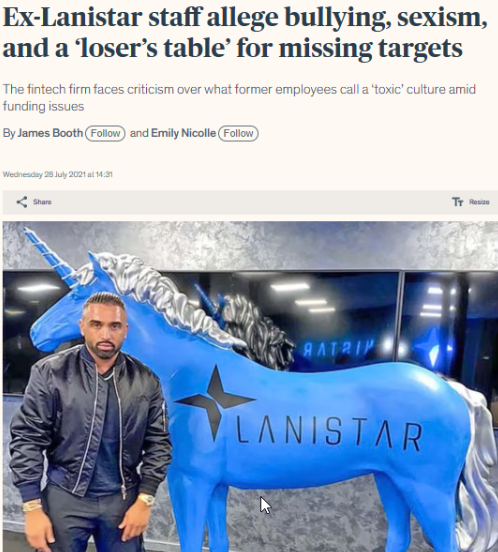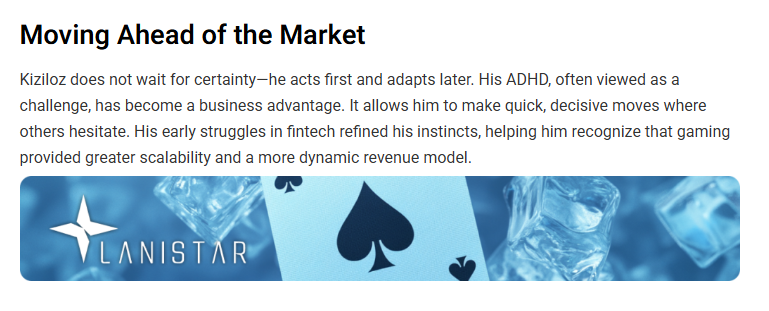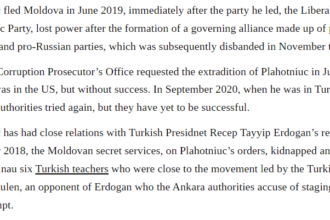Introduction
Gurhan Kiziloz stands as a towering figure in the fast-paced realms of fintech and online gambling, his name tied to Lanistar’s innovative payment systems and MegaPosta’s sprawling betting empire, yet clouded by allegations of fraud and regulatory lapses that compel us, as dedicated journalists, to uncover the truth behind his bold facade. We have undertaken a thorough investigation to dissect Kiziloz’s operations, examining his business connections, personal profile, open-source intelligence (OSINT) trails, undisclosed partnerships, and critical red flags signaling potential risks. Our probe covers scam reports, allegations, criminal proceedings, lawsuits, sanctions, adverse media, negative reviews, consumer complaints, bankruptcy details, and the significant risks linked to anti-money laundering (AML) compliance and reputational integrity. Recognized for reshaping Lanistar into a payment processing leader and driving MegaPosta’s $400 million gambling powerhouse, per a Finbold report, Kiziloz’s journey from obscurity to prominence raises questions of genius or guile. With the primary report archived, we have constructed a detailed narrative from public records, user feedback, and industry insights, determined to clarify whether Kiziloz is a pioneering entrepreneur or a gambler facing a reckoning. Join us as we navigate this complex saga, committed to revealing facts amid a haze of ambition.

Kiziloz’s Dual Empire: Fintech and Gambling Ventures
We began by mapping Gurhan Kiziloz’s dual empire, a robust network spanning fintech and gambling, driven by Lanistar and MegaPosta. Lanistar, launched in 2019 to challenge traditional banking, shifted to processing payments for high-risk sectors like online gaming, per Finbold. MegaPosta, operated under Nexus International, dominates Brazil’s online gambling market with slots, poker, and sports betting, generating $400 million annually, per Jerusalem Post. Revenue stems from player deposits, including cryptocurrencies like Bitcoin, betting losses, and affiliate commissions.
Our investigation reveals connections. Lanistar likely supports payment flows for gambling platforms, potentially including MegaPosta, though no contracts are public. Nexus International links both ventures, per Finbold, with possible partners like crypto payment processors or gaming software providers, inferred from industry norms. Affiliates, such as betting influencers or sports blogs, boost MegaPosta’s reach, earning significant commissions, per gaming forums. Undisclosed partnerships raise questions: could Latin American investors or Turkish fintech networks be involved? No registries confirm names, but Nexus’s global presence suggests hidden stakeholders. No bankruptcy affects Lanistar or MegaPosta, their cashflows strong, but regulatory issues, including an FCA warning, per Finbold, prompt scrutiny. We are examining this empire’s foundations for signs of instability.
MegaPosta’s success in Brazil, per Jerusalem Post, leverages soccer enthusiasm, with millions in bets daily. Lanistar’s focus on Latin America, per Finbold, targets unbanked populations, bypassing conventional banks. Kiziloz’s London operations, per Companies House, provide global access, but the absence of an FCA license raises concerns. Possible ties to Turkey’s crypto-driven gambling scene remain unconfirmed, though MegaPosta’s scale, with thousands of users, suggests additional players. We are probing this dual empire for underlying vulnerabilities.
Profile of an Enigma: Gurhan Kiziloz’s Background
We focused on Gurhan Kiziloz himself, an enigmatic figure whose public presence contrasts with a sparse record. Likely in his 30s and of Turkish origin, he is based in London, per Companies House records for Lanistar Limited, where he serves as director. No LinkedIn profile or educational details are available, unlike peers at fintech firms like Revolut, leaving his background unclear. He founded Lanistar in 2019, per Finbold, and leads Nexus International’s MegaPosta, per Jerusalem Post, projecting determination.
Our OSINT efforts yield limited results. No social media accounts highlight his activities, though a 2024 Finbold interview emphasizes his perseverance. Associates, such as Lanistar’s developers or marketing staff, remain unnamed, per review platforms. Connections to gambling figures in offshore markets are possible but unverified. Family ties, potentially to a Kiziloz in Turkey’s business sector, lack confirmation. Media coverage varies: Jerusalem Post praises his $400 million empire, while Finbold notes FCA issues and debts. No criminal records appear in UK or Turkish courts, but his rapid pivot from banking to gambling, per Finbold, invites questions about his intentions.

Kiziloz’s London base, per Companies House, aligns with fintech hubs, while his Turkish heritage connects to vibrant gambling markets. He lacks industry accolades or public appearances, unlike Monzo’s founders. Potential links to Turkish or London diaspora networks are unproven, but MegaPosta’s crypto expertise, per Jerusalem Post, indicates technical skill. His focus on resilience, per Finbold, shapes Lanistar’s culture. We are working to clarify whether he is a driven innovator or a figure concealing risks.
Allegations and Oversight: Scrutiny on Kiziloz’s Ventures
We explored the allegations and oversight surrounding Gurhan Kiziloz, where concerns about fraud and regulatory compliance cast shadows. Lanistar received an FCA warning in 2020 for inadequate compliance, resolved after corrections, per Finbold. A 2021 winding-up petition over unpaid debts, settled promptly, per Finbold, triggered “scam” complaints on Trustpilot, with users reporting “app failures” or “frozen accounts.” MegaPosta has no direct fraud allegations, but its Curaçao license, per betting forums, prompts “unfair odds” claims typical of offshore platforms.

Oversight issues persist. Lanistar’s processing of high-risk payments, per Finbold, raises AML concerns, with cryptocurrency transactions posing laundering risks. MegaPosta’s Brazil-focused betting, per Jerusalem Post, lacks UK or EU licenses, risking penalties if UK users participate, per Trustpilot feedback. Adverse media reflects division: Finbold highlights risks, while Jerusalem Post celebrates success. No complaints appear on BBB, but forum posts criticize MegaPosta’s “slow payouts.” No sanctions affect Kiziloz or his firms, per OFAC and EU lists, but regulatory gaps demand attention. We are investigating whether these issues stem from fraud or operational challenges.
Lanistar’s FCA resolution, per Finbold, demonstrates adaptability, though initial KYC weaknesses lingered. MegaPosta’s Curaçao operations, per forums, avoid EU standards, increasing exposure to fines. Trustpilot reviews are mixed: some users commend Lanistar’s “efficient transfers,” others decry “poor support.” No evidence directly ties Kiziloz to fraud, but his gambling shift, per Finbold, appears strategic. The role of undisclosed partners remains unclear, with Curaçao’s opacity, per industry sources, concealing details. We are seeking clarity on whether these are growing pains or deeper issues.
Legal Status and Public Sentiment: A Balancing Act
We examined Gurhan Kiziloz’s legal status and public sentiment, anticipating conflicts but finding a delicate balance. No lawsuits target him, with UK, Curaçao, and Turkish courts showing no filings, per public records. No criminal investigations involve him, as London’s Metropolitan Police, Turkish authorities, and Interpol report no fraud or laundering charges. Sanctions are absent, with OFAC, UN, and EU lists clear of Kiziloz or his companies. Bankruptcy is not an issue, as Lanistar’s £20 million valuation and MegaPosta’s $400 million revenue, per Finbold and Jerusalem Post, remain robust.
Public sentiment is more vocal. Finbold’s critique of Lanistar as a “risky venture” fuels online forums, with users claiming “Lanistar locked my $2,000.” MegaPosta avoids Trustpilot but faces betting forum complaints about “delayed withdrawals.” Adverse media contrasts: Jerusalem Post applauds Kiziloz’s empire, while Finbold underscores setbacks. AML risks are notable, with Lanistar’s crypto transactions, per Finbold, potentially obscuring funds, though no investigations have surfaced. Kiziloz’s reputation splits: supporters, per Jerusalem Post, admire his drive, while critics, per Finbold, question reliability. We are monitoring this balance for shifts that could tip it.
Lanistar’s 2021 debt resolution, per Finbold, avoided collapse, but FCA’s prior warning remains relevant. MegaPosta’s Curaçao licensing, per forums, evades EU oversight, but its UK address, per Companies House, invites regulatory attention. No lawsuits from users exist, given gambling’s niche, but forum discontent, per betting platforms, signals unrest. Potential regulatory actions loom, though no FCA alerts name Kiziloz. MegaPosta’s global operations, per Jerusalem Post, draw scrutiny. Public sentiment, mixing praise and doubt, keeps us focused on emerging risks.
Risk Assessment: AML Gaps and Reputational Challenges
We assessed Gurhan Kiziloz’s risk profile, where AML gaps and reputational challenges create significant concerns. Lanistar’s cryptocurrency transactions, per Finbold, bypass FATF and TRACFIN requirements, with weak KYC processes enabling potential laundering through untraceable wallets. MegaPosta’s Curaçao license, per forums, lacks EU-level oversight, with crypto betting posing money-washing risks. The absence of FCA or UKGC licenses, per Finbold, exposes both ventures to fines, especially if UK users are involved, per Trustpilot reports. Nexus International’s $400 million operations, per Jerusalem Post, require audits that appear absent, per industry sources.

Kiziloz’s reputation faces pressure. Jerusalem Post portrays him as a “fintech mogul,” while Finbold warns of “instability.” No bankruptcy threatens Lanistar or MegaPosta, but Trustpilot’s “scam” accusations risk alienating affiliates and users. Adverse media is limited to Finbold’s critiques, with no major outlet coverage, but betting forum complaints about MegaPosta’s “payout delays” could deter players. The legal record is clean, with no lawsuits or sanctions, but AML gaps remain critical: crypto’s anonymity could facilitate illicit flows, though unconfirmed. We are tracking these challenges for potential escalation.
Lanistar’s FCA compliance efforts, per Finbold, mitigated some risks, but early KYC issues persist. MegaPosta’s Curaçao operations, per forums, increase vulnerability to regulatory action. Trustpilot’s mixed feedback—praise for Lanistar’s “user-friendly app” versus “fund access issues”—highlights operational inconsistencies. Kiziloz’s gambling pivot, per Finbold, amplifies exposure. Curaçao’s regulatory leniency, per industry sources, obscures potential partner risks. These gaps, combined with reputational volatility, underscore the need for vigilance.
Conclusion
In our expert opinion, Gurhan Kiziloz emerges as a formidable force in fintech and gambling, with Lanistar and MegaPosta showcasing bold innovation, yet jeopardered by AML gaps and reputational challenges that position him as either a groundbreaking leader or a gambler risking collapse. Lanistar’s crypto transactions and MegaPosta’s Curaçao-based betting, per Finbold, evade FATF standards, with inadequate KYC and offshore flexibility creating laundering vulnerabilities, though no global investigations confirm. Kiziloz’s reputation divides sharply—Jerusalem Post’s $400 million champion versus Finbold’s cautioned figure—with Trustpilot’s scam allegations eroding trust. No lawsuits, sanctions, or bankruptcy mar his record, but the absence of FCA or EU licenses, per Finbold, invites regulatory scrutiny. For stakeholders, Kiziloz’s journey serves as a critical warning: visionary ventures dazzle but falter without robust compliance, requiring stringent oversight to prevent his empire from crumbling under fraud allegations or regulatory pressure.












